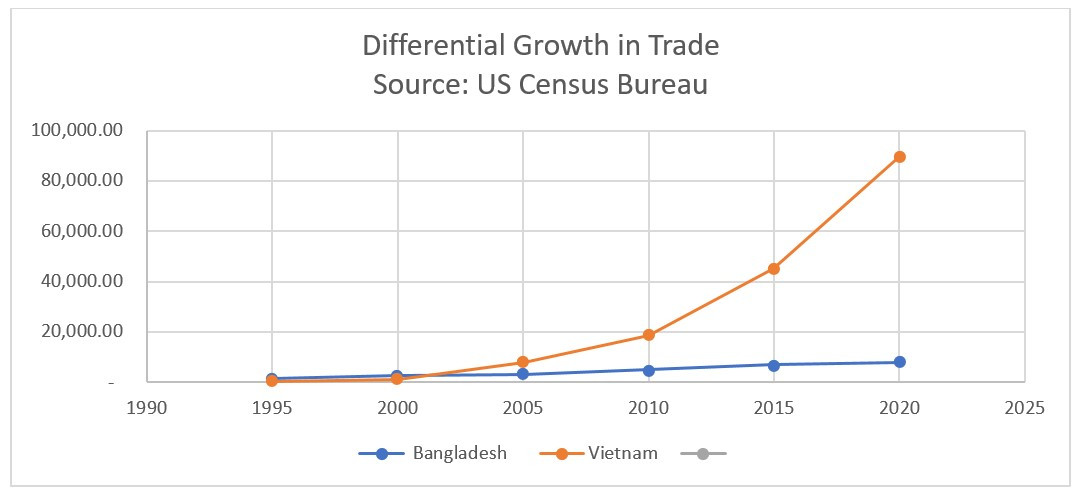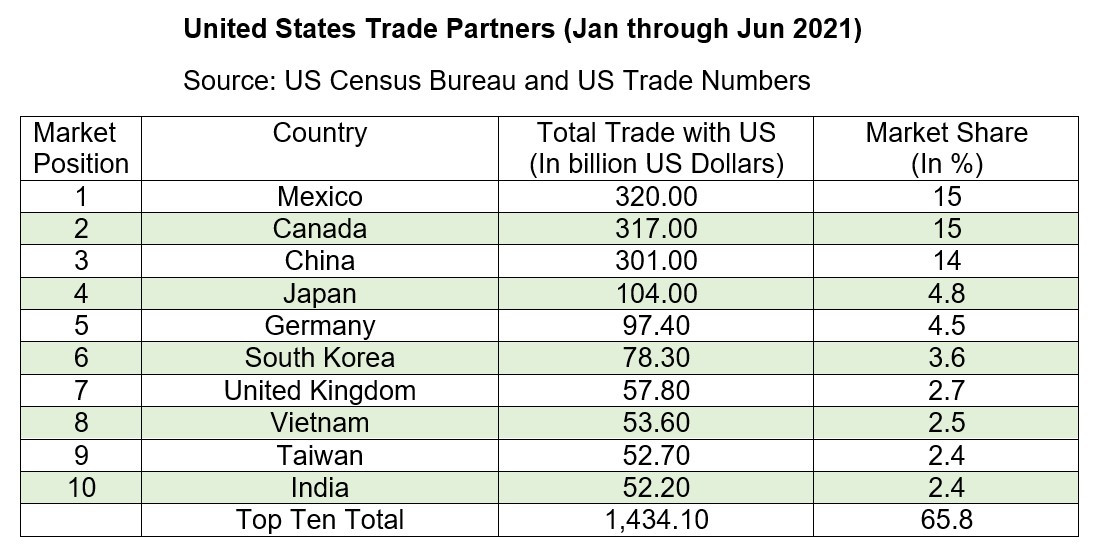While touring Las Vegas recently, Commerce Minister Tipu Munshi expressed Bangladesh government’s willingness to scale up trade with the United States. He was talking to attendees at the Men’s Apparel Guild In California (MAGIC), the biggest fashion marketplace in the US, showcasing apparel, footwear and accessories and sourcing resources from all around the world.
The Export Promotion Bureau (EPB) of Bangladesh has been patronising local mid-sized apparel manufacturers to participate in this fair for long. That is one laudable but small step in the way of boosting trade between the two countries.
What big steps have we taken to foster the nine-billion-dollar trade further? How Vietnam, with zero export to the US in 1993, has nearly eighty-billion-dollar export earnings? Did we compete intelligently, make smart use of our resources but still fell behind or swayed, carried away and gave up? Could things be done differently?
A TALE OF TWO NATIONS
In the early nineties, Vietnam did not have anything to sell! Instead, it bought from the US. It took the country till 1994 to send the first shipment, whereas we were sitting on $1 billion export and $1.3 billion in total trade that year. Twenty-six years later, Vietnam has registered an 11-fold growth than us in total trade and 13-fold in export only.

Braving the pandemic, Vietnam lifted its trade with the US to $89.63 billion in 2020, covering 2.38 per cent of America’s $3.76 trillion total trade volume. With China and Mexico retaining the top two positions, Vietnam made its way to the top 10. We were 46th with $7.92 billion, enjoying a not-so-significant 0.21 per cent market share.
The US Census Bureau has published data till the end of June, and it is apparent that total trade will exceed the $4-trillion mark. Among the top 10 players, China is down two spots, and Vietnam is up two notches!

Bangladesh continues to hold the 46th position with a $4.78 billion trade.
EXPORT BASKET
That we need to diversify our export basket is fashionably told by all quarters: government, business, and academia. Perhaps this is one of the rare areas where we have a national consensus!
Indeed, we have diversified. EPB statistics showed that in the fiscal year of 2020-21, our export to the US was $6.97 billion, composed of 68 kinds of products. Only two items – knitwear and woven garments – captured 85.26 per cent of the pie. If we add other textile products to that, it will go past 90 per cent.
In sharp contrast, Vietnam spearheads with cell phone-related equipment, furniture parts, seats (excluding barber and dental), and Portland, aluminous and slag cement. These were bigger than its $12.57-billion apparel export.
Vietnam carefully crafted its exportable for the US. We probably developed such market research neither at the public nor at the private level. The top five US imports consistently have been oil, passenger vehicles, computers, cell phone equipment, and medicines in individual dosages for many years. Vietnam struck two of them very well.
Back home, the recent focus on leather and non-leather shoes by both producers and regulators is visible. Our mainstream media emphatically covered that footwear export to the US from Bangladesh posted a 73.13 per cent growth in the fiscal year of 2020-21 to reach $230.2 million, up from $132.96 million in FY20.
Alongside, we can also put together all our power behind furniture, insulated wire, toys, children’s bicycles, refrigerators, freezers, and air conditioning machines – all on America’s rising demand list.
US BANGLADESH BUSINESS COUNCIL
After a series of talks between the Prime Minister’s Office, the Ministry of Commerce, the United States Trade Representative, and the US Chamber of Commerce, a US Bangladesh Business Council was launched in Washington on April 6, 2021. During the launch, it was said the council would serve as a platform for American businesses to engage both governments to promote opportunities for businesses to drive mutually beneficial economic growth.
We would like to view this as a big leap forward. Heavyweights like Chevron, GE, Visa, MetLife, or Facebook are sitting on the board of the USBBC.
One can also keenly see the developments in May through July. Google, Amazon, Facebook, and Microsoft, the four American tech giants, obtained Business Identification Number (BIN) as nonresidents and have started submitting VAT returns.
LAST WORD
With $754 million in trade in June, Bangladesh has made its way to the top five of the US’s “Fastest Growing Top 50 Trade Partners”. One might argue that these rankings vary widely from month to month. But registering a spot in the top five out of 212 countries and territories with an astounding 82.43 per cent rise is worth cherishing.
This suggests that total trade will hit $10 billion this year. But, that is an altitude we are scaling after 50 years of independence with over 100 million working people.
It is time we changed our habits a bit! Let us not concentrate only on the cash cow RMG rather eye on other products that the US has a lasting need for. This will require policy and monetary support and adjustments in physical and financial infrastructure. Let us do it!
We might have lost the battle, but we can still win the war!
The author is member of the Pacific Council on International Policy, and a former commercial counsellor of the Los Angeles Consulate.
















